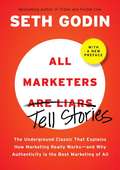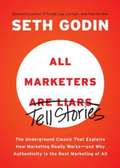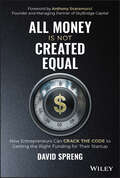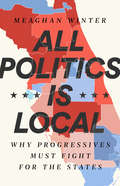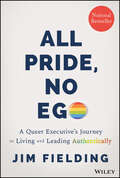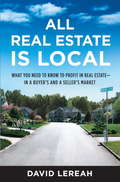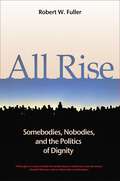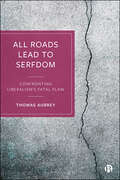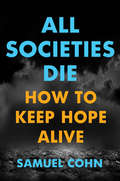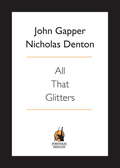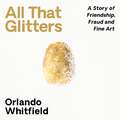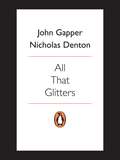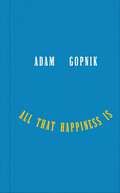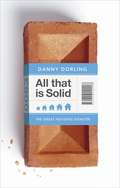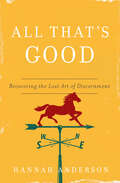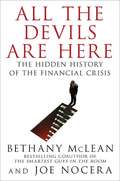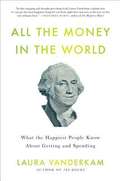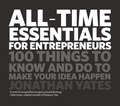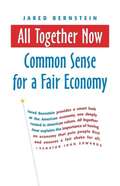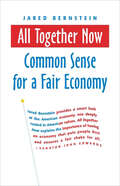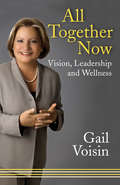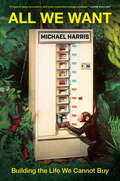- Table View
- List View
All Marketers Are Liars: The Power of Telling Authentic Stories in a Low-Trust World
by Seth GodinAs Seth Godin showed in this book, great marketers don't talk about features or even benefits. Instead, they tell a story--a story we want to believe, whether it's factual or not.
All Marketers are Liars (with a New Preface): The Underground Classic That Explains How Marketing Really Works--and Why Authenticity Is the Best Marketing of All
by Seth GodinSeth Godin’s three essential questions for every marketer: “What’s your story?” “Will the people who need to hear this story believe it?” “Is it true?” All marketers tell stories. And if they do it right, we believe them. We believe that wine tastes better in a $20 glass than a $1 glass. We believe that an $80,000 Porsche is vastly superior to a $36,000 Volkswagen that’s virtually the same car. We believe that $125 sneakers make our feet feel better—and look cooler—than a $25 brand. And believing it makes it true. As Seth Godin showed in this controversial book, great marketers don’t talk about features or even benefits. Instead, they tell a story—a story we want to believe, whether it’s factual or not. In a world where most people have an infinite number of choices and no time to make them, every organization is a marketer, and all marketing is about telling stories. Marketers succeed when they tell us a story that fits our worldview, a story that we intuitively embrace and then share with our friends. Think of the Dyson vacuum cleaner, or Fiji water, or the iPod. But beware: If your stories are inauthentic, you cross the line from fib to fraud. Marketers fail when they are selfish and scurrilous, when they abuse the tools of their trade and make the world worse. That’s a lesson learned the hard way by telemarketers, cigarette companies, and sleazy politicians. But for the rest of us, it’s time to embrace the power of the story. As Godin writes, “Stories make it easier to understand the world. Stories are the only way we know to spread an idea. Marketers didn’t invent storytelling. They just perfected it.”
All Money Is Not Created Equal: How Entrepreneurs Can Crack the Code to Getting the Right Funding for Their Startup
by David SprengFinance your company's growth without losing your stake in it Too often, thanks to multiple rounds of equity investment, company founders wind up with only a small fraction of the businesses they start. But this situation isn't inevitable. The intelligent use of a variety of financing options—including debt financing—can help to maintain, or even grow, a founder's stake. In All Money Is Not Created Equal: The Entrepreneur's Guide to Finding the Right Funding for Your Business, renowned Silicon Valley veteran David Spreng delivers an expert guide for entrepreneurs and founders seeking to maintain as much ownership stake as possible in the companies they create as they move through the various stages of the financing process. The book draws on the author's decades of experience as a venture capitalist, venture debt lender, and CEO of a publicly traded company in Silicon Valley, as well as interviews with entrepreneurs, board members, investors, and bankers. Readers will also find: A well-rounded and insightful perspective on the financing process informed by industry veterans An informal and accessible exploration of a complex topic that remains critical to the success of entrepreneurs and founders Discussions of alternatives to equity financing, including debt financing, in the growth phase of startups An essential handbook for startup founders, entrepreneurs, and managers, All Money Is Not Created Equal also deserves a place in the hands of company board members, venture capitalists, investors, and investment bankers interested in the company financing process.
All Politics Is Local: Why Progressives Must Fight for the States
by Meaghan WinterDemocrats have largely ceded control of state governments to the GOP, allowing them to rig our political system and undermine democracy itself.After the 2016 election, Republicans had their largest majority in the states since 1928, controlling legislative chambers in thirty-two states and governor offices in thirty-three. They also held both chambers of Congress and the presidency despite losing the popular vote. What happened?Meaghan Winter shows how the Democratic Party and left-leaning political establishment have spent the past several decades betting it all on the very risky and increasingly foolhardy strategy of abandoning the states to focus on federal races.For the American public, the fallout has been catastrophic. At the behest of their corporate patrons, Republican lawmakers have diminished employee protections and healthcare access and thwarted action on climate change. Voting rights are being dismantled, and even the mildest gun safety measures are being blocked.Taking us to three key battlegrounds--in Missouri, Florida, and Colorado--Winter reveals that robust state and local politics are the lifeblood of democracy and the only lasting building block of political power.
All Pride, No Ego: A Queer Executive's Journey to Living and Leading Authentically
by Jim FieldingAn inspiring and personal roadmap to servant leadership In All Pride, No Ego: A Queer Executive’s Journey to Living and Leading Authentically, celebrated corporate leader James Fielding delivers an inspirational leadership story told from the perspective of an out and proud LGBTQ+ executive. In the book, you’ll explore a call-to-action for authentic servant leadership that encourages people to own their truth and bring out the best in themselves and their communities. The author explains his key decisions and inflection points and highlights how his leadership style, learnings, successes, and failures informed his rise through the rungs of the corporate ladder. You’ll also find: The importance of becoming and remaining a lifelong learner and constantly curious How to control the controllable while leaving space for the possible Strategies for employing truthful and inspirational servant leadershipAn essential resource for managers, executives, directors, and other business leaders, All Pride, No Ego: A Queer Executive’s Journey to Living and Leading Authentically will also earn a place on the bookshelves of young, aspiring leaders seeking practical and impactful strategies for real-world leadership.
All Real Estate Is Local: What You Need to Know to Profit in Real Estate - in a Buyer's and a Seller's Market
by David LereahWhatever the national trends are with regard to real estate – whether they are booming or busting–what really matters is what the market conditions are in your region, town, or neighborhood. For as David Lereah points out, in the end, all real estate is local.What does that mean? Even during the real estate boom of 2001-2005, a great many cities and regions did not participate in the boom–they lagged behind, or even decreased in value. Similarly, when prices began to fall nationally, there were plenty of regions and locales where prices rose, and sales boomed. As Lereah makes clear, the most important factor in buying or selling a home isn&’t what is going on nationally–it is what is going on in your local market. Evaluating present and future trends and influences in your region or neighborhood is essential to creating long term wealth, whether you are in a buyer&’s or a seller&’s market. And David Lereah, as the Chief Economist for the National Association of Realtors, shows you how to determine the conditions in your neighborhood. Lereah reveals how to: Evaluate the DNA of homes in the town or county or region you are considering (every town has its own real estate DNA–the characteristics that make a region or city more or less desirable to live in).Determine whether property values in your targeted neighborhood are on the rise.Research future real estate influences and trends, from migration into or out of the region, to plans to attract or develop new businesses in the area. Understand the local factors that can affect your investment in the future.Countless books offer advice on how to buy and sell a home. But ALL REAL ESTATE IS LOCAL is the first book to explain how knowing the ins and outs of the local market you are targeting is essential to deciding when, where, and what to buy.
All Rise: Somebodies, Nobodies, and the Politics of Dignity (Bk. Currents Ser.)
by Robert W. FullerIn his groundbreaking book Somebodies and Nobodies, Robert Fuller identified a form of domination that everyone has experienced but few dare to protest: rankism, abuse of the power inherent in rank to exploit and humiliate someone of lower rank. It plays a role in just about every form of social oppressionÑracism, sexism, homophobia, and religious intolerance all have a significant element of rankism in them. Most everyone has felt the sting of rankism--at the hands of a dictatorial boss, a condescending teacher, an arrogant doctor, or an imperious bureaucrat. But, equally, most everyone has inflicted it on someone of lower rank. That we are, all of us, both victims and perpetrators of rankism mandates a novel, multifaceted strategy for confronting it. Fuller isn't proposing that we do away with rank--without it organizations become dysfunctional. He's not advocating an egalitarian society where all are equal in rank but rather a "dignitarian" one where all are equal in dignity: a society in which rankholders are held accountable, rankism is shunned, and dignity is broadly protected.
All Roads Lead to Serfdom: Confronting Liberalism’s Fatal Flaw
by Thomas AubreyLiberal democracies are under increasing pressure. Growing discontent about inequality, lack of political participation and identity have rekindled populism and a shift away from liberal values. This book argues that liberalism’s reliance on a utilitarian policy framework has resulted in increased concentrations of power, restricting freedom and equality. It examines five key areas of public policy: monetary policy, private property and liability, the structure of the state, product markets and labour markets. Drawing on the German ordoliberal tradition and its founding principle of the dispersal of power, the book proposes an alternative public policy framework. In doing so, it offers a practical pathway to realign policy making with liberal ideas.
All Societies Die: How to Keep Hope Alive
by Samuel CohnIn All Societies Die, Samuel Cohn asks us to prepare for the inevitable. Our society is going to die. What are you going to do about it? But he also wants us to know that there's still reason for hope. In an immersive and mesmerizing discussion Cohn considers what makes societies (throughout history) collapse. All Societies Die points us to the historical examples of the Byzantine empire, the collapse of Somalia, the rise of Middle Eastern terrorism, the rise of drug cartels in Latin America and the French Revolution to explain how societal decline has common features and themes. Cohn takes us on an easily digestible journey through history. While he unveils the past, his message to us about the present is searing.Through his assessment of past—and current—societies, Cohn offers us a new way of looking at societal growth and decline. With a broad panorama of bloody stories, unexpected historical riches, crime waves, corruption, and disasters, he shows us that although our society will, inevitably, die at some point, there's still a lot we can do to make it better and live a little longer.His quirky and inventive approach to an "end-of-the-world" scenario should be a warning. We're not there yet. Cohn concludes with a strategy of preserving and rebuilding so that we don't have to give a eulogy anytime soon.
All That Glitters
by John Gapper Nicholas DentonThe definitive, classic account of the fall of the House of Baring, the oldest merchant bank in London, in 1995 and the ultimate rogue trader, Nick Leeson, who brought down the venerable institution with speculative investing. John Gapper, associate editor of the Financial Times, and his coauthor Nicholas Denton, now founder of Gawker Media, interviewed all the major players involved in the collapse of one of England's oldest banks. All That Glitters reveals the Faustian deal struck between the whizz-kid derivatives traders who seemed to be bringing in huge profits and the old guard who were happy to pocket them without asking too many questions. Gapper and Denton present a thrilling, in-depth account of Nick Leeson's motives and methods for hiding the unauthorized speculative trading as well as the final days of Barings and the last-ditch attempts by politicians and bankers to save the bank.
All That Glitters: A Story of Friendship, Fraud and Fine Art: A Guardian and FT Book to Read in 2024
by Orlando Whitfield'One of the hottest memoirs of 2024' Sunday Times StyleA Guardian 'Books to look out for in 2024' pick * A Financial Times 'What to Read in 2024' pick'An art world Great Gatsby, deliciously withering and dishy.' Patrick Radden Keefe'Delicious, sharp and often breathtaking' Megan Nolan'A brilliant, devastating exposé' William BoydDECEPTION IS A FINE ART.When Orlando Whitfield first meets Inigo Philbrick, they are students dreaming of dealing art for a living. Their friendship lasts for fifteen years until one day, Inigo - by then the most successful dealer of his generation - disappears, accused of a fraud so gigantic and audacious it rocks the art world to its core.A sparklingly sharp memoir of greed, ambition and madness, All That Glitters will take you to the heart of the contemporary art world, a place wilder and wealthier than you could ever imagine.
All That Glitters: Anna Wintour, Tina Brown, and the Rivalry Inside America's Richest Media Empire
by Thomas MaierFrom the Bestselling Author and Television Producer of Masters of Sex, a True Story ofthe Intrigue and Infighting of Condé Nast, Anna Wintour, S. I. Newhouse Jr., and Tina Brown, and Optioned by Sony Television Productions Inside the Condé Nast magazine world run by billionaire S. I. Newhouse Jr., Anna Wintour and Tina Brown were bold and talented British women who fought their way to the top of this male-dominated American industry driven by greed and betrayal. Wintour became an icon of fashion and New York’s high society, while Brown helped define the intersection of literary culture and Hollywood celebrity. They jockeyed for power in the hypercompetitive “off with their heads” atmosphere set up by Newhouse and his longtime creative guru Alex Liberman, two men who for years controlled the glossy Condé Nast magazines that dictated how women should look, dress, and feel. In turning this world upside down, Wintour and Brown challenged the old rules and made Newhouse’s company internationally famous. Ultimately, one of them won in their fascinating struggle for fame and fortune during the height of New York’s gilded age of print—a time before the internet, before 9/11, when the Reagans ruled the White House and Donald Trump was a mere local developer featured on the cover of Newhouse’s publications. This book traces the careers of Wintour and Brown and shows how they and the Condé Nast media empire were major media enablers in the rise of Donald Trump and Hollywood mogul Harvey Weinstein. At its heart, All That Glitters is a parable about the changes in America’s media, where corruption and easy compromises are sprinkled with glitter, power, and glory. Originally titled Newhouse, this revised and updated edition, with a new introduction and afterword, won the 1994 Frank Luther Mott Award for best researched media book of the year.
All That Glitters: The Fall of Barings
by John GapperThe definitive, classic account of the fall of the House of Baring and the ultimate rogue trader Nick Leeson.John Gapper, Associate Editor of the Financial Times, and his co-author Nicholas Denton, now founder of Gawker Media, interviewed all the major players involved in the collapse of one of England's oldest banks.All That Glitters reveals the faustian deal struck between the whizz-kid traders who seemed to be bringing in huge profits and the grandies who were happy to pocket them without asking too many questions. For the first time, the actions and motives of all the participants are explained, including the final days when politicians and bankers made a last-ditch attempt to save the bank, as well as Nick Leeson's actions and motives.
All That Happiness Is: Some Words on What Matters
by Adam GopnikFrom New Yorker staff writer Adam Gopnik, a slim, elegant volume presenting a radical alternative to our culture of relentless striving. Our society is obsessed with achievement. Young people are pushed toward the next test or the “best” grammar school, high school, or college they can get into. Adults push themselves toward the highest-paying, most prestigious jobs, seeking promotions and public recognition. As Adam Gopnik points out, the result is not so much a rat race as a rat maze, with no way out. Except one: to choose accomplishment over achievement. Achievement, Gopnik argues, is the completion of the task imposed from outside. Accomplishment, by contrast, is the end point of an engulfing activity one engages in for its own sake. From stories of artists, philosophers, and scientists to his own fumbling attempts to play Beatles songs on a guitar, Gopnik demonstrates that while self-directed passions sometimes do lead to a career, the contentment that flows from accomplishment is available to each of us. A book to read and return to at any age, All That Happiness Is offers timeless wisdom against the grain.
All That Is Solid: How the Great Housing Disaster Defines Our Times, and What We Can Do About It
by Danny DorlingHousing was at the heart of the financial collapse, and our economy is now precariously reliant on the housing market. In this groundbreaking new book, Danny Dorling argues that housing is the defining issue of our times. Tracing how we got to our current crisis and how housing has come to reflect class and wealth in Britain, All That Is Solid radically shows that the solution to our problems - rising homelessness, a generation priced out of home ownership - is not, as is widely assumed, building more homes. Inequality, he argues, is what we really need to overcome.
All That We Share: How to Save the Economy, the Environment, the Internet, Democracy, Our Communities and Everything Else That Belongs to All of Us
by Jay WalljasperThe commons encompasses everything that is jointly owned by all of us, from gifts of nature, such as the airwaves and DNA, to products of human creativity and scientific knowledge, such as dance steps, religious traditions, and open-source software. In this introduction for general readers, Walljasper, a fellow at On the Commons (a commons movement strategy center) explains general concepts of the commons and why it matters, warning that much of the commons is under threat due to private interests. The book consists of short essays illustrated with b&w photos in a lively, reader-friendly layout. Many of the essays are credited to Walljasper and other writers from On the Commons, but others are excerpts from thinkers such as Jeremy Rifkin, Robert F. Kennedy Jr., and Winona LaDuke. Interspersed throughout the book are profiles of contemporary commons champions and boxes on real-life cases from around the country and around the world, such as an indigenous bill of rights, the Pacific Forest Trust, and the great Facebook rebellion. The book closes with advice for what ordinary people can do to restore the commons. Appendices offer a commons dictionary and a list of movies, novels, music, and art that evoke a spirit of sharing. Accessible to high school students and up, the book can be used as a supplemental text or for individual readers. Walljasper is former editor of Utne Reader. Annotation ©2011 Book News, Inc., Portland, OR (booknews.com)
All That's Good: Recovering the Lost Art of Discernment
by Hannah AndersonWinner of the 2018 TGC Book Award for Christian Living&“And God saw that it was good…&”Look out over the world today, it seems a far cry from God&’s original declaration. Pain, conflict, and uncertainty dominate the headlines. Our daily lives are noisy and chaotic—filled with too much information and too little wisdom. No wonder we often find it easier to retreat into safe spaces, hunker down in likeminded tribes, and just do our best to survive life. But what if God wants you to do more than simply survive? What if he wants you to thrive in this world, and be part of its redemption? What if you could rediscover the beauty and goodness God established in the beginning?By learning the lost art of discernment, you can. Discernment is more than simply avoiding bad things; discernment actually frees you to navigate the world with confidence and joy by teaching you how to recognize and choose good things. When you learn discernment and develop a taste for all that&’s good, you will encounter God in remarkable new ways. Come, discover the God who not only made all things, but who will also make all things good once again.
All That's Good: Recovering the Lost Art of Discernment
by Hannah AndersonWinner of the 2018 TGC Book Award for Christian Living&“And God saw that it was good…&”Look out over the world today, it seems a far cry from God&’s original declaration. Pain, conflict, and uncertainty dominate the headlines. Our daily lives are noisy and chaotic—filled with too much information and too little wisdom. No wonder we often find it easier to retreat into safe spaces, hunker down in likeminded tribes, and just do our best to survive life. But what if God wants you to do more than simply survive? What if he wants you to thrive in this world, and be part of its redemption? What if you could rediscover the beauty and goodness God established in the beginning?By learning the lost art of discernment, you can. Discernment is more than simply avoiding bad things; discernment actually frees you to navigate the world with confidence and joy by teaching you how to recognize and choose good things. When you learn discernment and develop a taste for all that&’s good, you will encounter God in remarkable new ways. Come, discover the God who not only made all things, but who will also make all things good once again.
All The Devils Are Here: The Hidden History of the Financial Crisis
by Bethany Mclean Joe Nocera"Hell is empty, and all the devils are here." - Shakespeare, The Tempest. As soon as the financial crisis erupted, the finger-pointing began. Should the blame fall on Wall Street, Main Street, or Pennsylvania Avenue? On greedy traders, misguided regulators, sleazy subprime companies, cowardly legislators, or clueless home buyers? According to Bethany McLean and Joe Nocera, two of America's most acclaimed business journalists, the real answer is all of the above - and more. Many devils helped bring hell to the economy. And the full story, in all of its complexity and detail, is like the legend of the blind men and the elephant. Almost everyone has missed the big picture. Almost no one has put all the pieces together. All the Devils Are Here goes back several decades to weave the hidden history of the financial crisis in a way no previous book has done. It explores the motivations of everyone from famous CEOs, cabinet secretaries, and politicians to anonymous lenders, borrowers, analysts, and Wall Street traders. It delves into the powerful American mythology of homeownership. And it proves that the crisis ultimately wasn't about finance at all; it was about human nature. Among the devils you'll meet in vivid detail: Angelo Mozilo, the CEO of Countrywide, who dreamed of spreading homeownership to the masses, only to succumb to the peer pressure - and the outsized profits - of the sleaziest subprime lending. Roland Arnall, a respected philanthropist and diplomat, who made his fortune building Ameriquest, a subprime lending empire that relied on blatantly deceptive lending practices. Hank Greenberg, who built AIG into a Rube Goldberg contraption with an undeserved triple-A rating, and who ran it so tightly that he was the only one who knew where all the bodies were buried. Stan O'Neal of Merrill Lynch, aloof and suspicious, who suffered from "Goldman envy" and drove a proud old firm into the ground by promoting cronies and pushing out his smartest lieutenants. Lloyd Blankfein, who helped turn Goldman Sachs from a culture that famously put clients first to one that made clients secondary to its own bottom line. Franklin Raines of Fannie Mae, who (like his predecessors) bullied regulators into submission and let his firm drift away from its original, noble mission. Brian Clarkson of Moody's, who aggressively pushed to increase his rating agency's market share and stock price, at the cost of its integrity. Alan Greenspan, the legendary maestro of the Federal Reserve, who ignored the evidence of a growing housing bubble and turned a blind eye to the lending practices that ultimately brought down Wall Street - and inflicted enormous pain on the country. Just as McLean's The Smartest Guys in the Room was hailed as the best Enron book on a crowded shelf, so will All the Devils Are Here be remembered for finally making sense of the meltdown and its consequences. (Includes pages of photos and captions after the index.)
All The Money In The World
by Laura VanderkamHow happy would you be if you had all the money in the world? The universal lament about money is that there is never enough. We spend endless hours trying to figure out ways to stretch every dollar and kicking ourselves whenever we spend too much or save too little. For all the stress and effort we put into every choice, why are most of us unhappy about our finances? According to Laura Vanderkam, the key is to change your perspective. Instead of looking at money as a scarce resource, consider it a tool that you can use creatively to build a better life for yourself and the people you care about. Drawing on the latest happiness research as well as the stories of dozens of real people, Vanderkam offers a contrarian approach that forces us to examine our own beliefs, goals, and values.
All Time Essentials for Entrepreneurs
by Jonathan YatesA pocket-sized pep-talk packed with inspiration and motivation.Got an idea for a business? Just started out? Or wondering what to do next? From planning and setting up, to raising finance and making a profit, All-Time Essentials for Entrepreneurs is your one-stop shop for advice and tips on everything you need to know and do to get your business off the ground.Jonathan Yates is a serial entrepreneur who understands that when you're launching or running your own business, you need ideas and answers fast. He runs regular seminars showing people just like you how to achieve their goals. His top 10 tips for success have been compared to those of business mogul and Apprentice TV show chairman, Sir Alan Sugar.Blending indispensable advice and short bursts of inspiration with motivational quotes from the world's greatest thinkers, All-Time Essentials for Entrepreneurs is the smart little sidekick you'll find yourself turning to again and again.'Jonathan has tremendous energy and drive. You can tap into that energy in this book.' Sahar Hashemi, co-founder of Coffee Republic'Jonathan is one of those rare individuals who has great business acumen as well as entrepreneurial insight. His passion to succeed is infectious.' Mike Clare, Dreams
All Together Now: Common Sense for a Fair Economy
by Jared BernsteinEconomist Jared Bernstein believes that frames such as "the ownership society" stress an ever-shrinking role for government and an ever-increasing risk for individuals, clearly implying "You're on your own."
All Together Now: Common Sense for a Fair Economy (Bk Currents Ser.)
by Jared BernsteinAs the new century unfolds, we face a host of economic and social challenges--jobs lost to "off shoring," a huge and growing number of Americans without health insurance coverage, an expanding gap between rich and poor, stagnant wages, decaying public schools, and many others. These are difficult and complex problems, but our government's strategy for dealing with them has been essentially not to deal with them at all. Over and over, in subtle and not-so-subtle ways, we're told that we're on our own--"Here's a tax cut and a private account; now go fend for yourself." As Jared Bernstein points out, this approach doesn't make any sense as a strategy for solving the enormous systemic problems we face. It's just a way of shifting economic risk from those most able to bear it--the government and the nation's corporations--to those least able: individuals and families. The result has been greater wealth for the top 1% of Americans and stagnant living standards and increasing insecurity for the vast majority. In All Together Now, Bernstein outlines a new strategy, one that applauds individual initiative but recognizes that the problems we face as a nation can be solved only if we take a more collaborative approach. The message is simple: we're all in this together. Bernstein draws on recent and historic events to explore how the proponents of what he dubs the YOYO (you're-on-your-own) approach have sold the idea, exposing the fallacies and ulterior motives in their arguments as well as the disasterous consequences of their policies. More importantly, he details practical WITT (we're-in-this-together) initiatives in specific areas like globalization, health care, and employment that could improve the lives of millions of Americans without increasing overall national spending. And he offers advice on how to overcome objections to the WITT agenda and bring the country together so that both risks and benefits are shared more fairly. While the prevailing philosophy insists that all we can do is cope with massive social forces, each of us on our own, Bernstein argues that we can unite and shape these forces to meet our needs. The optimistic message of All Together Now is that the economic challenges we face are not insoluble; we can wield the tools of government to meet them in such a way as to build a more just and equitable society.
All Together Now: Vision, Leadership, and Wellness
by Gail VoisinAchieving outstanding personal and organizational success in our busy, competitive, chaotic — yet very exciting — world requires a unique, leading-edge set of skills for 21st-century executives and leaders. It is critical for them to have the knowledge and ability to align the three key areas of Vision, Leadership and Wellness to measure and sustain high performance levels — the All Together Now Advantage™. When they do, not only will they be in great demand in corporations, but they will be able to live their dream now. In All Together Now, world-class Executive Coach Gail Voisin demonstrates the importance of:Finding your personal vision and linking it to your organization’s vision.Getting and staying laser-focused on areas of leadership that matter most to your personal and business success - accomplishing more while at the same time expending less energy.Staying physically and mentally healthy to enhance the overall quality of your life.
All We Want: Building the Life We Cannot Buy
by Michael HarrisOur lives are defined by a story of endless growth and consumption. Now a climate crisis demands that we change. Can we write new stories? In All We Want, award-winning author Michael Harris dismantles our untenable consumer culture and delivers surprising, heartwarming alternatives. Drawing on the wisdom of philosophers, scientists, and artists, Harris uncovers three realms where humans have always found deeper meaning: the worlds of Craft, the Sublime, and Care. Past attempts to blunt our impact on the environment have simply redirected our consumption—we bought fuel-efficient cars and canvas tote bags. We cannot, however, buy our way out of this crisis. We need, instead, compelling new stories about life's purpose. Part meditation and part manifesto, All We Want is a blazing inquest into the destructive and unfulfilling promise of our consumer society, and a roadmap toward a more humane future.
